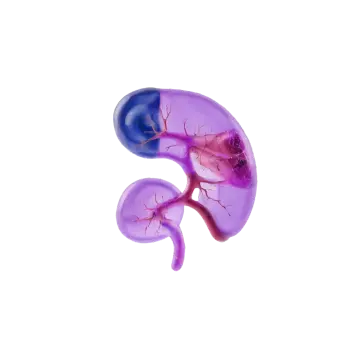What is chronic kidney disease?
Chronic kidney disease (CKD) is a condition that comes on insidiously where the kidneys' ability to filter blood gradually deteriorates over at least three months. An accumulation of waste products, hormonal disorders and an imbalance in fluid and electrolyte balance occurs in the kidneys. There are five different stages that are classified based on the degree of impaired kidney function. At this stage, one has kidney failure.Common symptoms of chronic kidney disease
Chronic kidney disease can come on insidiously and is difficult to detect without targeted screening as it does not produce any clear symptoms in the early stages. As kidney function deteriorates further, the following symptoms may occur:
- Low energy and fatigue
- Concentration problems
- Nausea and loss of appetite
- Swelling (edema), especially in the legs, ankles and around the eyes
- Foamy urine (proteinuria)
- Increased amount of urine, especially at night
- Itching
- Shortness of breath (may be due to fluid retention or anemia)
What are the causes of chronic kidney disease
Here are common causes of chronic kidney disease:
- Diabetes mellitus (type 1 and type 2)
- Hypertension (high blood pressure)
- Glomerulonephritis (inflammatory kidney disease)
- Polycystic kidney disease (hereditary cyst formation in the kidneys)
- Long-term use of certain medications (such as NSAIDs)
- Age-related decline in kidney function
How can chronic kidney disease be detected?
Chronic kidney disease is often discovered by chance, as the symptoms are often nonspecific and may occur late in the course of the disease. A diagnosis is made using tests:
- Blood test (measurement of creatinine and eGFR – estimated glomerular filtration rate)
- Urine test (analysis of albumin or protein in the urine)
- Blood pressure check
- Ultrasound of the kidneys (to detect structural abnormalities)
It is very important to detect chronic kidney disease early to slow the progression of the disease.
Symptoms vary depending on the degree of kidney function impairment
In CKD, the symptoms are often linked to the degree of kidney function impairment. In mild to moderate kidney disease, symptoms are subtle, while advanced disease can produce clear signs of urinary changes, fluid retention, metabolic acidosis, electrolyte disturbances and hormonal imbalances.
Anemia – common in chronic kidney disease
In CKD, anemia is a common finding and occurs as a result of a deficiency of erythropoietin – a hormone that is normally produced in the kidneys and stimulates the bone marrow to form red blood cells. The anemia is usually normochromic and normocytic, and contributes to symptoms such as fatigue, shortness of breath, headache and pallor.
Phosphate and chronic kidney disease
The regulation of phosphate levels in the body is carried out by the kidneys; in case of impaired kidney function, the excretion of phosphate decreases, which can lead to hyperphosphatemia. High phosphate levels negatively affect calcium balance, stimulate the release of parathyroid hormone (PTH) and can lead to secondary hyperparathyroidism and calcifications in blood vessels and soft tissues. This contributes to an increased risk of osteoporosis and cardiovascular complications.






















